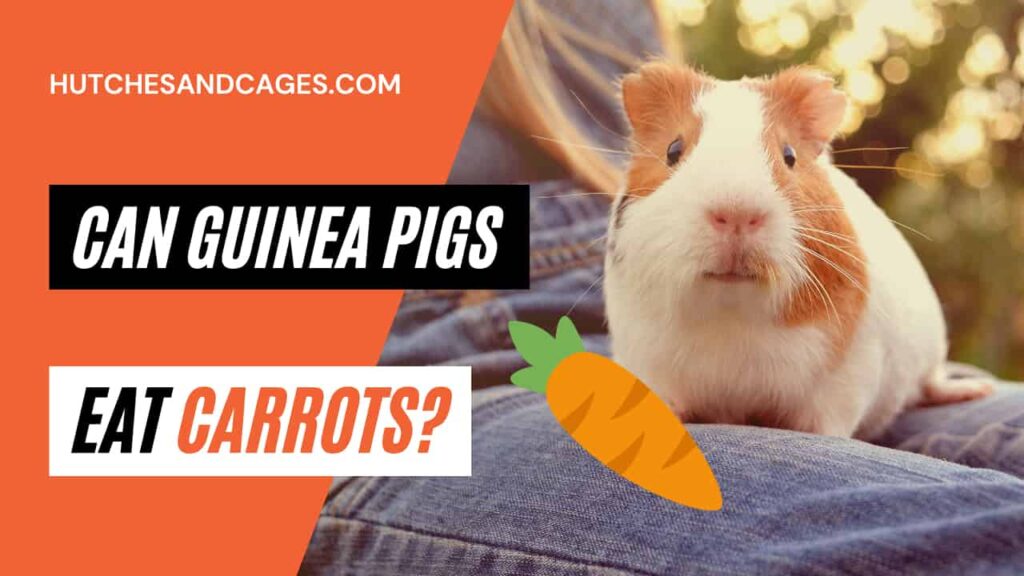Have you wondered about feeding your fluffy guinea pig a piece of carrot? Do you know whether carrots are beneficial to them?
Let’s find out more about carrots and guinea pigs!
Can Guinea Pigs Eat Carrots?
Yes, Guinea pigs can eat medium-sized carrots and baby carrots. You can serve one slice (cubic inch) of carrot twice a week to your pig. Carrots carry many vitamins and minerals. However, it should be fed in moderation. Carrot skin, tops, and chips are also edible for guinea pigs.
In this blog, you will discover different answers to your questions related to Guinea Pigs and carrots.
Can Guinea Pigs Eat Carrots?

Yes, Guinea pigs can eat carrots because it contains nutrients like Vitamin A, Vitamin C, Fiber, and Beta carotene essential for your little pet’s health. Carrots also include a moderate amount of natural sugars that can cause several health issues if fed excessively.
Guinea pigs need vegetables for their proper growth, and carrot is one. Its diet generally consists of hay, water, vegetables, and fruits.
Adult guineas can eat carrots safely, but what about baby guineas? Can baby guinea also eat carrots? Well, no! You should not feed a carrot to your baby guinea in starting weeks of birth. During this timeframe, baby guineas need alfalfa hay and mother milk.
However, after some weeks, you can introduce carrot to your baby guinea but only in small amounts.
Providing a well-balanced diet to your adorable guinea pig is your supreme responsibility.
Can Guinea Pigs Have Raw Carrots?
Yes, guinea pigs can eat raw carrots as they are entirely healthy for their health.
Can Guinea Pigs Eat Baby Carrots?
Yes, baby carrots are best suited for guinea pigs. They can easily eat them because of their small size. However, if you are feeding a normal carrot to your guinea pig then make sure to cut it into small pieces. This will help guinea pigs in eating.
Can Carrots Kill Guinea Pigs?
No, carrots can’t kill guinea pigs if fed in the right amount. Carrots are healthy for your little pet but only in moderation. It consists of several natural sugars that can be harmful to your guinea pig.
So, only feed carrot in a suitable amount to avoid further complications.
Benefits of Carrots
Carrots have the right amount of magnesium, fiber, potassium, and a lot of Vitamin B and C. Because of the amount of fiber, carrots are great for Guinea Pig’s constipation problems. It also helps to promote good heart health and reduces blood pressure. Carrots also minimize the chance of leukemia and colorectal cancer in Guinea Pigs.
It is an excellent source of antioxidants that fight against free radicals in the guinea pig’s body. Carrots contain a high amount of Vitamin A and Vitamin C, which are essential to support guinea pig’s immune systems and vision.
It helps boost overall health and prevents diseases like cancer, tumors, etc.
How Many Carrots Can Guinea Pigs Eat?
Guinea pigs love eating carrots, but the serving amount should constantly be monitored. You can give your guinea pig a small handful amount of carrots or a few pieces only.
Carrots contain Vitamin C, carbohydrates, fibers, and several essential vitamins and minerals needed for guinea pig’s health. Like human beings, guinea pigs can’t produce their vitamins, so they need rich foods to make their diet balanced.
Can Guinea Pigs Eat Carrots Every Day?
Can guinea pigs eat carrots every day? Well, not! It would help if you only fed a carrot to your guinea pig as a treat once or twice a week.
If you overfeed your guinea pig, it could lead to serious digestive problems such as diarrhea, vomiting, or gases. And for a more extended period, too many carrots can cause bladder or kidney stones due to calcium.
Can Guinea Pigs Eat Carrot Tops?
Yes, Guinea pigs can eat carrot tops along with the carrot. In fact, your little pet will love to eat the greeny carrot tops. They love to eat green leaves and also have several potential health benefits.
Can Guinea Pigs Eat Carrot Leaves?
Yes, guinea pigs can eat carrot leaves. Your little pet will love to eat green leaves as they are rich in Vitamin A, Vitamin, Fiber, Calcium, and potassium.
Can Guinea Pigs Eat Carrots Skin?
Yes, guinea pigs can eat carrot skin too. It is not harmful to your little pet. However, it depends on whether you serve carrot with or without skin.
Sometimes a carrot is grown with many fertilizers and pesticides in the land. So, always wash the carrots carefully and thoroughly before serving them to your little pet.
Can Guinea Pigs Eat Carrot Chips?
Yes, Guinea pigs can eat carrot dried and carrot chips, but later one is not recommended. You can mix them in a fruit salad, yogurt, or cheese.
Carrot chips are not favorable because they are coated with sugar and honey, making them extra sweet.
Can Guinea Pigs Eat Carrot Cake?
Carrot cake is too sweet for your guinea pig’s tiny stomach. Too much sugar in its diet can lead to several health issues.
How to Prepare Carrots for Guinea Pigs?
I have discussed the best way to prepare carrots for your little guinea pig in the next steps:
- Choose the right carrot for your guinea pig
- Carrots must be fresh and ripe properly because unripe can lead to several health issues
- Wash the carrots properly and clean their skin from any pesticides to avoid any complications
- After this, peel the skin of the carrot or if you don’t want then it’s okay too.
- Then make small slices of carrots for your guinea pig to make it easy for digestion
Final Thoughts
Carrots are healthy for guinea pigs, even they love their sweet flavor, but remember that too many carrots can be unhealthy and give them side effects like bloating, gas, diarrhea, and upset stomach. However, carrot skin, tops, and chips are also edible for guinea pigs. Baby carrots and medium-sized carrots are both suitable for your little pet.
SmallPetsX.Com does not provide veterinary advice. Our aim to help small pet owners understand their pets a little better so that they can provide their pets with the life they deserve. All content is therefore for informational purposes only. If you're concerned about the health of your pet you should seek medical advice from a vet.




